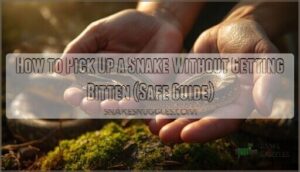This site is supported by our readers. We may earn a commission, at no cost to you, if you purchase through links.
 A rattlesnake in your garage sounds like a simple catch-and-release situation—until you realize that keeping it, even temporarily, might require state permits, federal compliance, and liability insurance. Most people don’t think about licensing when they imagine owning a snake, but the reality is far more complex than picking up a pet at the local reptile show.
A rattlesnake in your garage sounds like a simple catch-and-release situation—until you realize that keeping it, even temporarily, might require state permits, federal compliance, and liability insurance. Most people don’t think about licensing when they imagine owning a snake, but the reality is far more complex than picking up a pet at the local reptile show.
The legal landscape varies dramatically depending on where you live and what species you’re handling. Venomous species face the strictest scrutiny, but even harmless corn snakes can trigger permit requirements if they’re non-native to your state.
Understanding these regulations isn’t just about avoiding fines—it’s about protecting yourself, your community, and the animals themselves from preventable problems.
Table Of Contents
- Key Takeaways
- Understanding Venomous Snake Ownership Laws in The United States
- Navigating The Legalities of Owning Non-Venomous Snakes
- Liability and Insurance Considerations for Snake Owners
- Venomous Snake Ownership Permits and Application Process
- Navigating The Complexities of Snake Ownership Laws
- Frequently Asked Questions (FAQs)
- What are the costs associated with snake ownership licenses?
- How often do snake ownership licenses need to be renewed?
- What documentation is required for obtaining a venomous snake license?
- Can I own a venomous snake without a license in an emergency situation?
- What happens if I move to a new state with my snake?
- What happens if my snake escapes?
- Can I travel across state lines with snakes?
- Are there tax deductions for snake ownership?
- How do breeding regulations affect snake owners?
- What penalties exist for owning illegal species?
- Conclusion
Key Takeaways
- Snake ownership laws operate on three overlapping levels—federal (Lacey Act for interstate transport), state-specific permits that vary wildly in cost and requirements, and local ordinances that can ban species outright even when state law allows them.
- Venomous snake permits demand proof of expertise through certified training courses, detailed facility inspections showing escape-proof enclosures with proper labeling, and specialized liability insurance that most standard homeowners policies explicitly exclude.
- Most people don’t realize that even non-venomous snakes trigger permit requirements based on whether they’re native or non-native to your state, with invasive species like Burmese pythons costing over $120 billion annually in ecological damage and driving strict regulatory responses.
- Failing to stay current on rapidly changing regulations can result in permit revocations, fines up to $25,000, animal confiscation, and criminal charges—checking state wildlife agency updates quarterly and consulting legal professionals before acquisitions protects you from enforcement actions.
Understanding Venomous Snake Ownership Laws in The United States
Owning a venomous snake isn’t as simple as buying one and bringing it home. Federal, state, and local laws create a complex web of regulations you’ll need to understand before you even think about acquiring one.
Let’s break down what you’re up against at each level of government.
Federal Regulations on Venomous Snake Ownership
At the federal level, you won’t find a blanket ban on venomous snakes, but the Lacey Act—enacted in 1900—tightly controls interstate commerce and transport. This law prohibits moving wildlife across state lines if it violates any state regulations, making compliance with local laws essential.
The U.S. Fish and Wildlife Service (USFWS) enforces the Lacey Act, while CITES regulates international trade to protect endangered species. Always research state laws and federal regulations before acquiring venomous snakes.
The Act also requires a permit for the importation of injurious wildlife into the United States.
State-Specific Laws for Venomous Snake Ownership
Once you’ve confirmed federal compliance, you’ll face a patchwork of state-specific snake laws. States like Colorado outright prohibit private venomous snake ownership unless you hold a Commercial Wildlife Park License, while Arizona allows native venomous species without permits but regulates exotics.
Alabama and Pennsylvania require permits for venomous snakes, with criteria covering age, experience, and enclosure standards. Species classification also matters—Nevada distinguishes rattlers from copperheads, shaping transport regulations differently.
Permit reciprocity rarely exists, so moving across state lines means starting fresh with local variances in mind. Some states have specific rules regarding reptile ownership laws, so always check local regulations.
Local Ordinances and Additional Restrictions
Even with state permits in hand, you’re not done yet. City bans and local snake ordinances can add another layer of regulation—or shut down ownership entirely. Some Ohio counties require additional permits for restricted snakes, while New York City bans certain exotic species in residential buildings unless you secure special authorization. Florida counties like Miami-Dade mandate annual registration on top of state-level compliance.
Consider these local hurdles:
- Zoning laws may prohibit venomous snakes in residential or multi-unit properties, particularly in urban areas
- Permit costs vary widely by jurisdiction, ranging from $25 in Georgia to $100 in Florida, with annual renewals required
- Homeowners associations often enforce stricter species restrictions than municipal codes
- Enforcement mechanisms include fines, permit revocations, and confiscation, with some areas conducting regular compliance inspections
Always verify city and county state-specific snake laws before bringing a snake home.
Licensing and Permit Requirements Across Different States
Each state has its own permit fees, species restrictions, and enclosure inspections, with permit reciprocity being a rarity. Texas charges $20 for its Controlled Exotic Snake Permit, which does not include sale rights. California requires a Restricted Species Permit for around $50, along with detailed emergency plans. Florida mandates 1,000 hours of handling experience and facility inspections. Renewal periods typically range from one to three years. Interstate transport is governed by the Lacey Act, so it is essential to check state regulations and local ordinances before crossing borders.
| State | Permit Fee | Key Requirement |
|---|---|---|
| Texas | $20 | Proof of experience or hunting license |
| California | ~$50 | Emergency action plan, facility layout |
| Florida | Varies | 1,000 hours handling experience, inspections |
| Georgia/Hawaii | Banned | No snake ownership permitted |
Navigating The Legalities of Owning Non-Venomous Snakes
Non-venomous snakes might seem straightforward to own, but the legal landscape isn’t as simple as you’d think. Different rules apply depending on whether your snake is native to your state, how you plan to acquire it, and what species you’re keeping.
Let’s walk through the key permit requirements, species restrictions, and reporting obligations you’ll need to understand before bringing a non-venomous snake home.
Permit Requirements for Non-Venomous Snakes
You’ll likely need a permit for nonvenomous snakes, though requirements differ by state. The application process generally involves submitting proof of identity, residence documentation, and sometimes a detailed housing plan.
Permits cost $25 to $50 annually and remain valid for up to three years. Renewal guidelines require reapplication before expiration, with fees ranging from $78 to $146.
Some jurisdictions mandate facility inspections to verify enclosure safety. Age restrictions usually require applicants to be 18 or older with clean wildlife violation records.
Regulations on Native Vs. Non-Native Snake Species
Understanding the difference between native and non-native snakes will shape your path forward as a snake owner. Native species—those naturally found in your state—often face stricter ownership rules because of conservation laws. States like Alaska outright prohibit keeping native snakes as pets to protect wild populations from being depleted. Non-native species, however, come with their own challenges tied to invasive species concerns and ecosystem impact.
Large constrictors such as Burmese pythons have caused devastating ecological damage in Florida, reducing small mammal populations by over 90% and costing millions in management efforts. That’s why many states now prohibit specific non-native snakes or require special permits.
- Conservation laws protect native snakes from collection and harm
- Invasive species regulations prevent ecosystem disruption from non-natives
- Disease transmission risks from non-native snakes affect public health
- Economic costs from invasive management influence state regulations
- Prohibited species lists vary greatly between jurisdictions
Check both state regulations and local ordinances before acquiring any snake.
Importation and Exportation Laws for Snake Ownership
Moving snakes across borders—whether international or state lines—demands careful attention to federal regulations and CITES Regulations. The Lacey Act strictly prohibits interstate transport of injurious species like brown tree snakes without authorization, while import permits and health oversight from agencies like the U.S. Fish and Wildlife Service guarantee compliance during snake importation and exportation.
| Requirement Type | Authority | Key Compliance Step |
|---|---|---|
| International Trade | CITES | Non-Detriment Findings for listed species |
| Federal Declaration | U.S. Fish & Wildlife Service | Submit Form 3-177 at designated ports |
| Health Screening | CDC | Meet quarantine and disease prevention standards |
You’ll face fines up to $20,000 or imprisonment for violations, so maintain documentation, including permit numbers and species origin records. The Lacey Act means you can’t legally transport that Burmese python across state lines without proper permits—even if your destination state allows ownership.
Reporting and Renewal Processes for Non-Venomous Snake Licenses
Renewing your non-venomous snake license isn’t complicated, but don’t treat it like an afterthought. Maryland’s DNR requires annual renewal between July 1 and June 30, with a $50 permit fee and complete documentation—including your logbook detailing each reptile’s origin and status. Miss the deadline, and you’ll need a brand-new application instead of a simple renewal.
Compliance standards demand you keep records for three years, so database integration across state and federal systems can flag inconsistencies during inspections.
Liability and Insurance Considerations for Snake Owners
Owning a snake—venomous or not—comes with financial risks that most standard insurance policies won’t cover. You’ll need to understand what your current policy includes, when specialized liability coverage becomes necessary, and how to handle emergencies if something goes wrong.
Let’s look at the insurance protections and safety measures every responsible snake owner should consider.
Homeowners and Renters Insurance Coverage for Exotic Pets
Most homeowners insurance and renters insurance policies won’t cover snake-related incidents—over 70% of insurers explicitly exclude exotic pets from liability coverage. That means if your snake escapes or causes injury, you’re financially exposed.
Standard policies generally deny claims involving reptiles, and undisclosed ownership can trigger policy cancellation. Specialty animal riders exist but cost 30–70% more, and securing coverage remains difficult: fewer than 15% of snake owners obtain meaningful liability insurance for snakes.
Specialized Liability Insurance for Venomous Snake Ownership
If your state mandates venomous snake permits, specialized liability insurance isn’t optional—it’s a legal compliance checkpoint. In Florida, Texas, and Georgia, you can’t renew your license without proof of coverage.
Policies from providers like Prime Insurance or XInsurance run $200–$1,000 annually for standard collections, covering bodily injury and property damage that homeowners policies exclude. High-risk setups with multiple hot species push premiums past $5,000.
Underwriters evaluate your containment systems, species list, and handling experience to determine cost factors and risk management requirements—falsehoods void your policy and violate wildlife laws.
Preparing for and Responding to Venomous Snake Bites
Even with insurance locked down, bite response protocols matter—because your life or someone else’s depends on getting first aid right. The United States sees 7,000–8,000 venomous snake bites annually, with most caused by pit vipers like rattlesnakes and copperheads.
If a bite happens, your response window is narrow:
- Stay calm and call 911 immediately—panic accelerates venom circulation through elevated heart rate.
- Immobilize the affected limb below heart level—pressure immobilization slows venom spread but requires proper training to execute safely.
- Never apply tourniquets, ice, or attempt suction—these worsen tissue damage and complicate medical treatment.
- Get to a hospital within two hours—antivenom works best early, reducing complications like tissue necrosis and coagulopathy.
Antivenom access varies by region, but most trauma centers stock CroFab or ANAVIP. Medical costs for severe bites can exceed $100,000 due to antivenom pricing ($2,000–$5,000 per vial), hospitalization, and potential surgeries. Long-term recovery may involve months of rehabilitation depending on bite severity.
Venomous Snake Ownership Permits and Application Process
Getting a permit to own venomous snakes isn’t as simple as filling out a form and paying a fee. Most states require you to prove you know what you’re doing, meet strict safety standards, and keep up with ongoing obligations.
Here’s what the application process usually involves and what you’ll need to prepare.
Required Documentation and Proof of Expertise
When you’re ready to own venomous snakes, you’ll need to prove you know what you’re doing. Most states require Training Certification from approved programs—generally 14-hour courses covering safe handling and emergency protocols. You’ll also submit detailed facility verification documents showing double-lock enclosures, signage, and escape plans.
Federal oversight under the Lacey Act demands health certificates and species origin records, while state documentation varies—Virginia charges $10, Maryland wants bills of sale. Keep everything on file for at least three years—renewal obligations kick in annually, and inspectors will check your paperwork matches your setup.
| Documentation Type | Common Requirements |
|---|---|
| Training proof | Certified handling course completion (14+ hours) |
| Facility plans | Enclosure specs, safety protocols, escape procedures |
| Health records | Veterinary certificates, disease-free confirmation |
| Acquisition proof | Bills of sale, legal origin documentation |
Age Restrictions and Experience Qualifications
You’ll need to be at least 18 to apply for venomous reptile permits in most states—Arkansas, California, and Louisiana all enforce this minimum age. Beyond that birthday, expect to show real expertise. California wants two years of full-time handling experience, while programs like Save The Snakes require 14 hours of classroom and field training. Arkansas also runs background checks, blocking anyone with recent wildlife or animal cruelty convictions.
- Minimum age: 18 years old across most U.S. jurisdictions
- Experience prerequisites: Two years of documented handling or certified training courses
- Legal eligibility: Clean record with no wildlife-related offenses in the past five years
Secure Enclosure and Safety Protocol Requirements
After you’ve met the age and experience bar, your enclosure and safety protocols take center stage. Most states demand enclosures sized to your snake—Indiana requires perimeters at least 1.5 times the snake’s length for animals under six feet. North Carolina wants escape-proof, bite-proof cages with operable locks, while Louisiana mandates locked rooms housing locked cages.
You’ll also need clear labeling—species name, antivenin type, and emergency contacts posted visibly. Handling protocols should specify tools like hooks and tongs, and your emergency plan must detail escape response and bite procedures.
| Requirement | Example Standard |
|---|---|
| Enclosure Design | Perimeter 1.5× snake length (Indiana) |
| Facility Security | Locked room with restricted access (Louisiana) |
| Labeling Requirements | Species, antivenin, owner ID visible (North Carolina) |
| Emergency Plans | Written bite protocol and escape recovery |
Permit Fees, Renewal Timelines, and Reporting Obligations
Permit cost variations run wide—Ohio charges $300 for restricted snake propagation permits, while Maryland’s captive reptile permit costs just $10 annually. Renewal frequency differences matter too: South Carolina’s venomous permits last three years, but Virginia’s expire every calendar year.
Reporting detail levels include sales records, animal counts, and location changes. Application deadline flexibility varies—South Carolina wants renewals 30 days before expiration, while federal APHIS licenses require 90-day advance notice.
Penalty severity levels can mean forfeited fees or six-month reapplication waits if you miss inspections.
Navigating The Complexities of Snake Ownership Laws
Snake ownership laws can feel like a maze, especially when state and federal rules don’t always line up. You’ll need to understand why certain species are banned, how to tell native from non-native snakes, and where to find the latest regulatory updates.
Here’s what you should know to stay compliant and avoid costly mistakes.
Understanding The Rationale Behind Prohibited Species Lists
Prohibited species lists exist because the cost of inaction is steep. Invasive species drain $120 billion annually from U.S. ecosystems and economies, while ecological risk from unregulated reptile trade threatens native species and public safety.
Federal and state agencies use legal frameworks like the Lacey Act to prevent economic impact and conserve biodiversity. By targeting species before they establish, these restrictions protect your local ecosystem from irreversible harm.
Distinguishing Between Native and Non-Native Snake Species
When you’re trying to tell native species from nonnative invaders, species identification becomes critical for legal compliance and conservation efforts. Florida illustrates the stakes: it hosts 50 native snake species but has documented invasive impacts from tens of thousands of Burmese pythons since 1979.
Here’s what you need to know:
- Native snakes face habitat competition and often have stricter ownership rules to protect dwindling populations
- Nonnative species like ball pythons and boa constrictors generally arrive through pet trade channels
- Reporting sightings of unfamiliar snake species to 888-IVE-GOT1 helps prevent establishment of new invaders
Understanding snake habitats and snake identification protects both your compliance status and local ecosystems.
Staying Up-to-Date on Rapidly Changing Regulations
Regulations shift like wind patterns—what’s legal today might require a new permit next month. South Carolina’s February 2025 introduction of House Bill 3937, for instance, completely overhauled venomous reptile ownership rules overnight, demanding permits where none existed before. You’ll need practical strategies to track these rapidly changing snake regulations and maintain legal compliance.
Here’s how to stay current with state-specific laws:
- Use legislation tracking tools like Wildlife for All’s 2025 database to monitor bills across all states by title and introduction date
- Sign up for USARK alerts delivering real-time notifications when your state proposes permit revisions or species bans
- Enable automated bill tracking through your state legislature’s website to catch amendments affecting exotic animal laws
- Check your state wildlife agency’s site quarterly—enforcement mechanisms and compliance challenges surface there first
- Join reptile forums where owners discuss local ordinance changes and share public participation opportunities in hearings
Your permit could depend on catching a regulatory update before renewal deadlines pass.
Consulting With State Wildlife Agencies and Legal Professionals
State wildlife agencies and legal professionals aren’t just bureaucratic checkpoints—they’re your navigation team through constantly shifting regulations. Over 1,300 species fall under U.S. wildlife statutes, with enforcement delegated to state-level agencies that issue permits and conduct compliance inspections. Legal professionals help you interpret prohibited species lists, draft containment plans, and address liability requirements—like Ohio’s mandate for antivenom documentation submitted to local law enforcement.
| Resource Type | What They Provide | When You’ll Need Them |
|---|---|---|
| State Wildlife Agencies | Permit applications, species lists, inspection scheduling | Initial licensing, annual renewals, regulatory updates |
| Legal Professionals | Liability advice, appeal support, documentation review | Complex applications, administrative actions, policy changes |
| Snake Consultants (e.g., K2C) | Safety training, community education, handling protocols | Expertise demonstrations, public outreach, risk management |
| Agency Websites | Public directories, compliance resources, updated statutes | Quarterly checks, pre-application research |
| Wildlife Attorneys | Interstate transport guidance, CITES compliance, seizure response | Multi-state ownership, importation questions, enforcement issues |
Agency consultations guarantee your documentation requirements meet state-specific snake laws. Legal compliance hinges on understanding that proof of expertise, veterinary agreements, and financial responsibility vary dramatically by jurisdiction—what works in Virginia won’t satisfy Maryland’s COMAR 08.03.11 requirements. Risk management becomes critical when states mandate liability coverage or emergency response plans for venomous species.
Don’t navigate these legal requirements alone—state agencies conducted 1,230 compliance inspections in 2024, resulting in 182 permit suspensions.
Frequently Asked Questions (FAQs)
What are the costs associated with snake ownership licenses?
You’ll need to budget anywhere from $20 to over $4,000 depending on your state and the type of snake you’re keeping.
Initial fees, renewal costs, inspection expenses, and additional permit requirements all stack up quickly.
How often do snake ownership licenses need to be renewed?
Most states require annual renewal of your snake ownership license, though a few offer multi-year permits that last up to three years. Venomous snake permits generally expire faster—within 12 months—while some non-venomous licenses may extend longer if veterinary verification confirms proper care.
What documentation is required for obtaining a venomous snake license?
You’ll submit application forms with government ID, proof of experience (training certificates or handling logs), detailed enclosure design blueprints, safety protocols, and emergency preparedness plans—think of it as assembling a dossier to demonstrate competence and minimize risk.
Can I own a venomous snake without a license in an emergency situation?
You can’t legally own a venomous snake without a license, even in an emergency situation. Unlicensed possession carries serious penalties—fines up to $25,000, jail time, and potential liability if someone gets hurt.
Reporting snake discoveries immediately to wildlife authorities is your safest bet.
What happens if I move to a new state with my snake?
Before crossing state lines with your snake, check the destination state’s regulations like you’d check the weather—essential planning prevents disaster.
Interstate snake transport demands research into new state regulations, species restrictions, and quarantine requirements, plus obtaining necessary permits before your move to guarantee full compliance with federal and state snake laws.
What happens if my snake escapes?
If your snake escapes, you’ll need to notify authorities immediately—especially for venomous species. Legal consequences can include fines, permit revocation, and liability for public safety incidents or environmental damage. Proper enclosure design and escape prevention protocols help you avoid these penalties.
Can I travel across state lines with snakes?
You’ll navigate federal regulations and state restrictions when traveling with your snake. Interstate transport of snakes often requires permits, with legal penalties for violations—some states ban certain species entirely.
Always check destination laws before moving to a new state with a snake.
Are there tax deductions for snake ownership?
Many believe owning a snake guarantees tax breaks, but that’s rarely true. Generally, snakes don’t qualify for deductions unless you’re running a legitimate business—like breeding for profit or using them for pest control—where expenses become ordinary and necessary business costs under IRS guidelines.
How do breeding regulations affect snake owners?
Breeding permit costs range from $50 to $44 annually in most states, with registration procedures usually handled online through wildlife agencies. Renewal fee periods are generally yearly.
Facility standards require escape-proof enclosures meeting species-specific regulations for licensed breeders.
What penalties exist for owning illegal species?
If you’re caught with prohibited species, expect serious consequences. Fines range from $100 to $25,000, depending on jurisdiction and violation severity. Imprisonment can span 30 days to one year.
Authorities will confiscate your animal immediately, and community service penalties may follow.
Conclusion
The moment you skip research on snake licenses, you’re one anonymous complaint away from losing your animal—or worse. Whether you’re drawn to venomous species or keeping a ball python in your apartment, understanding permits isn’t optional bureaucracy.
It’s the foundation of responsible ownership. State regulations shift constantly, and what’s legal today might require different documentation next year.
Stay proactive: verify your compliance regularly, maintain proper records, and treat licensing as protection rather than paperwork. Your diligence keeps both you and your snake secure.
- https://regulations.justia.com/states/maryland/title-08/subtitle-03/chapter-08-03-11/section-08-03-11-05/
- https://dwr.virginia.gov/forms-download/PERM/PERM-016.pdf
- https://worldanimalfoundation.org/advocate/exotic-animal-laws-by-state/
- https://www.aphis.usda.gov/awa/apply
- https://animaladvocacyacademy.com/wild-animal-ownership-exotic-pets-roadside-zoos-and-public-risk/













